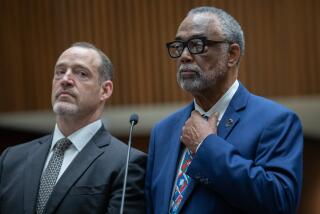Former Hahn appointee faces conflict charges
- Share via
A former president of the Los Angeles Board of Building and Safety Commissioners has been charged with three criminal conflict-of-interest counts for voting to approve permits for an engineering firm that had hired his company, a prosecutor said Friday.
The Los Angeles County district attorney filed the misdemeanor charges against Efren R. Abratique, who is scheduled to be arraigned Wednesday.
“We are concerned any time you have any kind of public official acting for his own interest instead of the interest of the public,” said Dave Demerjian, head of the district attorney’s Public Integrity Division.
If convicted, Abratique could face fines of up to $1,000 and up to one year in jail for each count.
Abratique, who was appointed to the board by then-Mayor James K. Hahn in 2002, did not return calls for comment. But his attorney, Fred Woocher, disputed that his client broke the law, arguing that Abratique’s vote for the permits did not enrich the engineering firm.
“It didn’t occur to him that he was violating the law,” Woocher said. “I don’t see that this constitutes a violation.”
Abratique, 56, is the fourth former Hahn commission appointee to face criminal charges in the last year.
That federal and state prosecutors are going after alleged misconduct at Los Angeles City Hall is encouraging to Kathay Feng, executive director of California Common Cause.
“It serves as a good deterrent to other public officials and lets them know it’s important that they take seriously the conflict-of-interest laws,” Feng said of the filing against Abratique.
The Times reported in 2006 that Abratique voted at least three times to approve permits sought by Psomas Inc. while that engineering firm was paying Abratique’s company $10,000 a year for services.
The criminal charges allege that on Aug. 3, 2004, Oct. 18, 2005, and March 21, 2006, Abratique had a conflict of interest when he made “a governmental decision in which the defendant knew and had reason to know he had a financial interest.”
A resident of San Pedro, Abratique is a civil engineer and president and owner of SafeProbe Inc., which provides pothole repairs and utility surveying.
Abratique reported in required financial disclosure statements filed with the city that Psomas was a source of income of $40,000 or more for SafeProbe over the four years ending in 2006.
Psomas is a Los Angeles-based consulting firm often hired by developers to pursue permits.
In August 2004, Abratique was among three board members who approved a permit for Psomas, allowing the removal of 19,900 cubic yards of dirt from a construction site. He voted for another permit to remove 40,000 cubic yards of dirt from a lot planned for a development at 10776 W. Wilshire Blvd.
In another vote, he and three other board members approved a permit and certified a project as environmentally benign, despite a neighbor’s complaint that the grading could create dust and noisy truck trips.
But Woocher argued that Psomas was the applicant on behalf of a developer who needed the permit, so its approval did not enrich Psomas.
“There was no financial effect on Psomas by this administerial approval of a haul route,” Woocher said.
Abratique was removed from the building and safety board in June 2006 by Mayor Antonio Villaraigosa without explanation.
In addition to being a co-owner of SafeProbe Inc., he is a co-owner of the engineering firm Abratique and Associates.
In September 2003, Abratique’s two companies were fined $1,500 by the city Ethics Commission for violating campaign finance laws when the two firms each contributed to Hahn’s campaign committee and the election of City Councilman Tony Cardenas.
City law limits contributions to $1,000 from each source to mayoral candidates and $500 to council candidates, and the two firms each contributed those amounts to Hahn and Cardenas.
An investigation concluded that SafeProbe and Abratique and Associates should have been considered one source because they share the same owners and board of directors members, so their contributions exceeded city limits.
More to Read
Sign up for Essential California
The most important California stories and recommendations in your inbox every morning.
You may occasionally receive promotional content from the Los Angeles Times.











